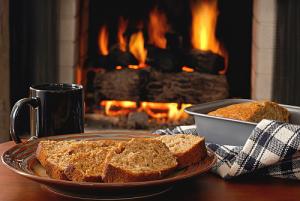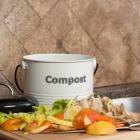Composting and buying local in the winter, is that even possible?
Submitted by Zack Carlan on | Updated Sat, 17/09/2016 - 23:49

March can be a ruthless month in Canada. Days are short, ice is everywhere, and sometimes even when there are hints of spring, there seems to be a sudden flash blizzard with no warning. Dreaming about the sun and fresh air is a daily activity and warm weather just doesn’t seem close enough. Some say the best way to fight the winter blues is to get cozy inside with some comfort food.
While eating and buying good food may feel like a positive thing in the winter months, there can also be negative environmental impacts. It’s easy to waste food and forget to be mindful in the winter. This guide with tips and tricks will show you that it really isn’t that hard. With just a couple steps, you can reduce your impact that these activities have on climate change and the environment in general!
-
Try to buy food items that are local and in season right now
Buying food in season produces many benefits to a consumer in the winter. For one, buying seasonal produce can be a low impact activity, which in this case, means there is a lower amount of greenhouse gas emissions produced because the food has not had to travel very far. Also, it is much cheaper to buy this seasonal produce!
This can be done easily in the winter (especially in Canada) with the access of a few guides. Here is a good one from Foodland Ontario to get started!
https://www.ontario.ca/foodland/page/availability-guide
Also, ever been to some great farmers markets in the summer? Turns out, they run in the winter too! Here is a list of indoor farmers markets in the Toronto area.
http://www.blogto.com/eat_drink/2013/12/winter_farmers_markets_in_toronto/
http://www.farmersmarketsontario.com
Buying local in season food will help fight climate change because it reduces the amount of greenhouse gas emissions that are emitted from transporting food! Instead of a large truck transporting produce from a farm in Florida to Ontario, buying local allows a lower travel time and therefore a lower amount of emissions.
The David Suzuki Foundation estimates a Canadian household produces 250 kg of food waste a year! That’s 500 kg of Co2 every year according to Watch My Waste. The WorldWatch institute estimates that eating local, in season products can potentially save 5 to 17 times less carbon dioxide than those from other products. Therefore if you ate 25% local food every year you could reduce your carbon footprint by up to 80 kg of CO2!
-
Learn to compost in the winter
Composting in the winter is easy! It might be a little colder outside but reducing food waste is essential to lowering your carbon footprint. Composting reduces the amount of waste that goes into a landfill, turns waste into useful product for gardens, and minimizes chemicals. Home composting reduces the dependence on fossil fuels from other composting techniques and landfill disposal options.
Some tips and tricks include making sure that your compost pile is protected from unwanted precipitation, rodents and other elements to allow proper decomposing processes. One way to do this is to tarp your compost pile or create a barrier for the compost pile. The winter elements seen in March can slow down the decomposition process especially when temperatures fall below zero. Creating an insulation barrier from ice and cold temperatures with a number of materials can help this.
Here is more information on how to do this: http://www.earth911.com/home-garden/guide-to-composting-in-the-winter/
Winter composting will fight climate change by lowering your carbon footprint. Lowering your waste means lowering the amount of material in a landfill. Less landfill material means a lower amount of methane being produced. Winter composting reduces the amount of methane produced in landfills and allows you to use compost for other needs. Recycling and reduction are both incorporated into winter composting!
If you decided to winter compost 50% of your food waste based on the estimation by David Suzuki. You could end up reducing around 100 kg of CO2 every year!
-
Grow your own indoor food!
Growing your own food in the winter is easier than it may seem. As long as you have some soil, containers and a spot in your home with sun, you can grow food indoors.
Growing your own food saves you money on groceries, saves you trips to the store, and is surprisingly tasty. It also reduces your emissions! Growing your own food can fight climate change, as it does not require trips to the grocery store. You are also not buying food at the store that has used vehicles that have been releasing greenhouse gas emissions!
Lettuce, Kale, Arugula, Tomatoes, Beans and Herbs are all great options to grow in the winter or beginning of spring. Just pick up a package of seeds at a nearby store and follow the instructions. It’s easier than you think.
According to this great carbon rally challenge, planting a vegetable garden can save you approximately 18 kg of CO2. Lets say you planted half of that in your house during the winter, that would save you 10 kg of CO2 per year!
-
Engage in normal low-waste and green food activities
-
Meatless mondays
-
Shop smart
-
Monitor what you throw away
-
Eat leftovers and use it all
-
Store your food properly
-
Buy organic and local
-
Reduce plastic bag use
-
Eat less red meat
These are all activities that can be performed throughout the year but especially in the winter. Continue to engage in these activities because they reduce your carbon footprint, reduce food waste and are great for the environment. The winter is a tough time of year especially when it seems to just be rolling into spring. Don’t forget that little actions go a long way and will help no matter how small the action.
Sources for CO2 estimations
http://watchmywaste.com.au/food-waste-greenhouse-gas-calculator/
http://www.davidsuzuki.org/what-you-can-do/food-and-our-planet/help-end-food-waste/
http://www.worldwatch.org/node/6064
You will save the Earth by sharing and/or tweeting (corny right?)





